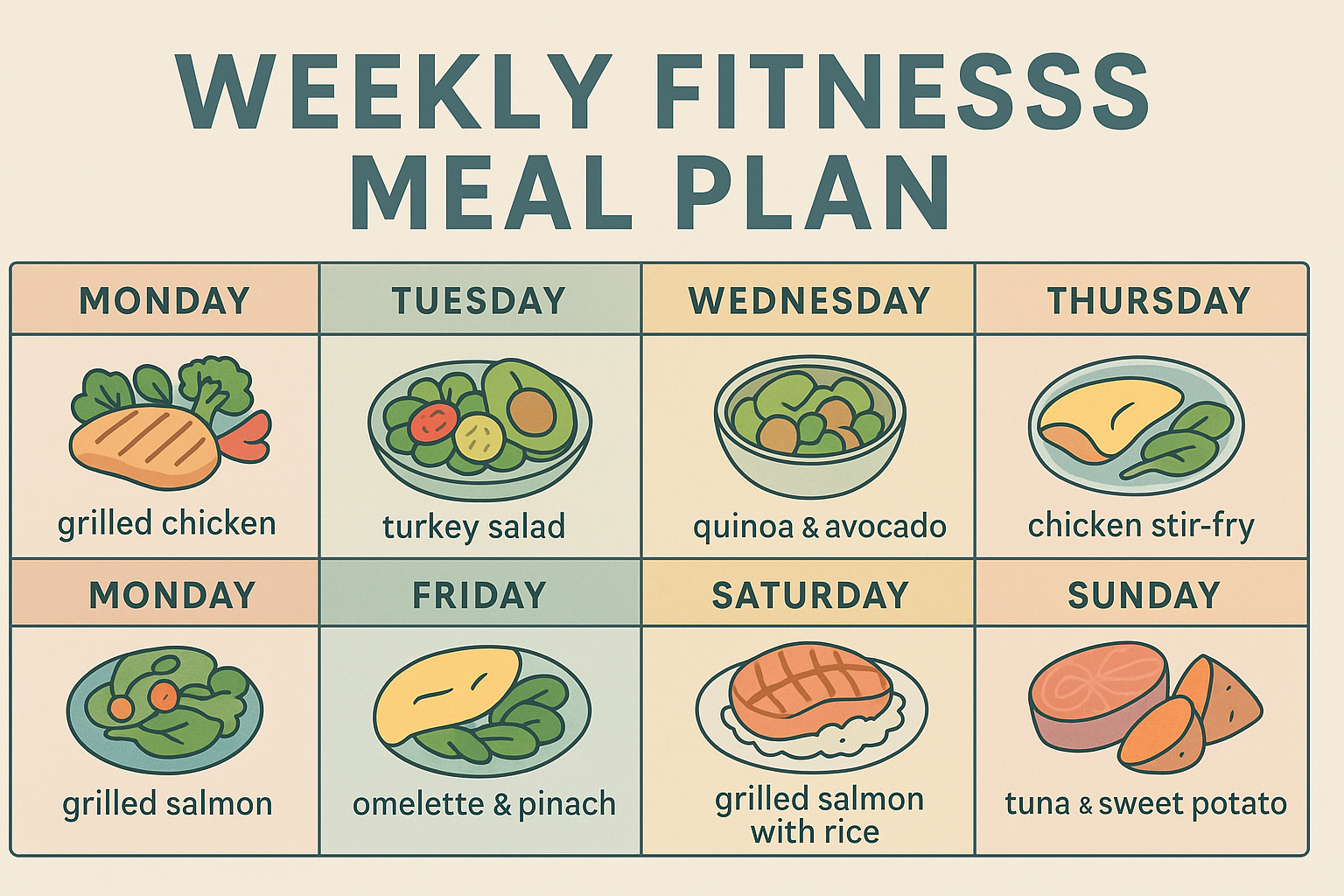Fitness diet is one of the most effective ways to maintain a healthy body, lose weight sustainably, and boost energy levels. However, many people find it difficult to plan healthy meals consistently throughout the week. That’s why creating a structured, flexible meal plan is key to long-term success.
In this article, you’ll discover how to build a complete weekly fitness meal plan that’s practical, affordable, and aligned with your health goals.
Why a Fitness Diet Plan Matters
A consistent meal plan helps you:
- Avoid unhealthy food choices during the week.
- Stay within your caloric and macronutrient goals.
- Save time and money by shopping with a purpose.
- Improve digestion, focus, and sleep quality.
When your meals are planned, you’re more likely to stick to your fitness journey, whether you’re aiming for fat loss, muscle gain, or better overall wellness.
Key Components of a Fitness Meal Plan
Before diving into the weekly plan, it’s important to understand what your meals should include:
- Protein: Essential for muscle repair and growth. Include chicken breast, fish, eggs, lentils, tofu, and Greek yogurt.
- Complex Carbohydrates: For sustained energy. Opt for brown rice, sweet potatoes, quinoa, oats, and whole-grain pasta.
- Healthy Fats: Crucial for hormone production and brain function. Use olive oil, avocado, nuts, and seeds.
- Vegetables and Fruits: Provide fiber, antioxidants, and essential vitamins. Vary the colors for maximum benefits.
- Hydration: Drink at least 2 to 3 liters of water daily.
Sample Weekly Fitness Meal Plan
Here’s a simple, flexible template you can follow and adjust to your taste and goals:
Monday
- Breakfast: Oatmeal with banana and chia seeds.
- Snack: Boiled egg + apple.
- Lunch: Grilled chicken with quinoa and steamed broccoli.
- Snack: Greek yogurt + almonds.
- Dinner: Baked salmon with sweet potato and green beans.
Tuesday
- Breakfast: Whole grain toast with peanut butter and sliced strawberries.
- Snack: Protein shake + handful of walnuts.
- Lunch: Turkey meatballs, brown rice, mixed salad.
- Snack: Carrot sticks + hummus.
- Dinner: Lentil stew with brown rice and spinach.
Wednesday
- Breakfast: Scrambled eggs + avocado toast.
- Snack: Cottage cheese + pineapple.
- Lunch: Grilled tilapia with mashed sweet potatoes and kale.
- Snack: Handful of cashews + orange.
- Dinner: Chicken stir-fry with broccoli, bell peppers, and brown rice.
Thursday
- Breakfast: Smoothie with protein powder, banana, oats, and almond milk.
- Snack: Boiled egg + a small pear.
- Lunch: Quinoa salad with chickpeas, cucumber, tomatoes, and olive oil.
- Snack: Low-fat yogurt + flaxseed.
- Dinner: Ground beef with brown rice and sautéed zucchini.
Friday
- Breakfast: Pancakes made with oats and banana + honey drizzle.
- Snack: Mixed nuts + green tea.
- Lunch: Grilled chicken wrap with veggies and whole wheat tortilla.
- Snack: Apple slices + peanut butter.
- Dinner: Tuna steak with asparagus and baked potato.
Saturday
- Breakfast: Omelet with spinach and tomatoes + whole wheat toast.
- Snack: Protein bar (low sugar) + black coffee.
- Lunch: Grilled shrimp with couscous and arugula.
- Snack: Fruit salad + cottage cheese.
- Dinner: Vegan chili with black beans, tomatoes, and avocado.
Sunday
- Breakfast: Smoothie bowl with berries, granola, and chia seeds.
- Snack: Hard-boiled egg + sliced cucumber.
- Lunch: Roasted turkey breast with mashed cauliflower and green peas.
- Snack: Rice cakes + almond butter.
- Dinner: Zucchini noodles with lean turkey Bolognese.
Tips for Meal Prepping Success
- Plan ahead: Shop and cook on Sundays or another convenient day.
- Batch cook: Prepare proteins, grains, and vegetables in larger quantities.
- Store smart: Use airtight containers to keep meals fresh.
- Label everything: Include date and meal type to stay organized.
- Adjust portions: Tailor meal sizes to your calorie needs.
Common Mistakes to Avoid
- Skipping meals, especially breakfast.
- Overconsuming fitness snacks marketed as “healthy.”
- Ignoring portion sizes.
- Not drinking enough water.
- Repeating the same meals too often (which may cause nutritional gaps).
Final Thoughts
Building a fitness diet is not about being perfect—it’s about creating a routine that supports your goals and fits into your life. With just a little planning each week, you’ll feel more energized, improve your performance, and stay on track long-term.
Whether you’re just starting or looking to optimize your routine, use this guide to help you stay consistent, nourished, and motivated!

